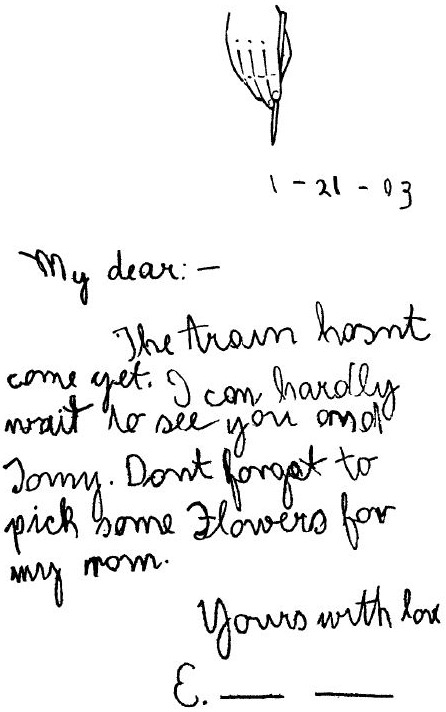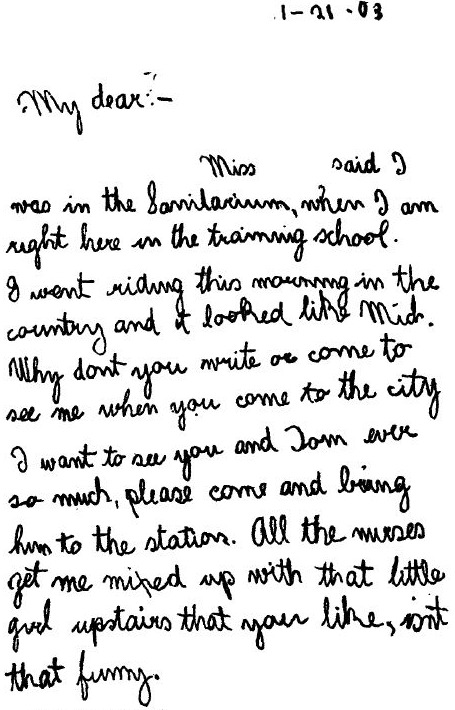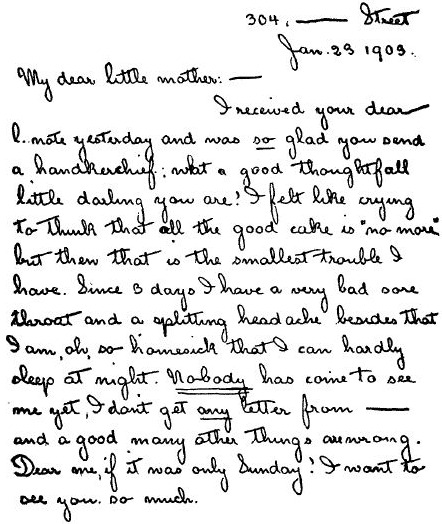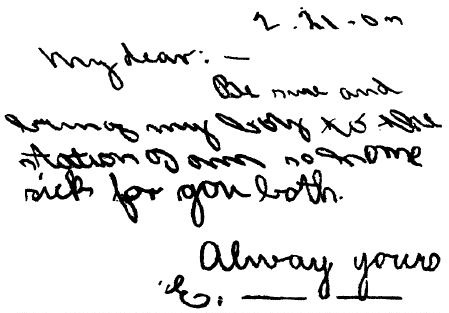Psychology Classics On Amazon

A Case of Disordered Personality
Classic article on disordered personality, first published in The Journal of Abnormal Psychology in 1907.
Become A Psychology Patron
If you like this website please support my Patreon page so that I can continue to create free content and resources for psychology students and educators; like making this classic psychology article freely available.
Want To Study Psychology?
The Article in Full
Summary: An incomplete alteration of consciousness of sixteen days' duration in a girl of twenty-three, with assumption by the patient of name of another person and a total change of hand-writing, the same being reversed both vertically and laterally; the state of altered consciousness being preceded by several months of pseudo-paranoia - apparently an evolution of systematized delusions, which were taken for facts, however, by her associates, - probably a hysterical or histrionic fabrication of the patient. Previous history of migraine, hysteria and erotomania, of homo-sexual character.
The disorder of personality in the case here presented did not amount to complete double personality, certain memories being carried from one state to another. The history is fragmentary, embracing only the observations of three months with little previous or subsequent knowledge of the case obtainable.
This patient, Case No. 1727, an unmarried woman, aged twenty-three, born in Germany, was an under-graduate in a nurses' training school. The family history as far as obtained is negative except that the mother was eccentric and died at thirty-five. The patient was subject to severe migraine from her nineteenth year and to aggravated insomnia. She was apt and skillful in the training school; her ward duty was severe, and there was much additional strain for her in the training-school course, the written tasks in English being very difficult to her from imperfect English education, though she was well schooled in her native tongue and of bright mind. In her headaches she had been at times delirious, and once attempted to get out of a third-story window.
Once she remained apparently unconscious for twenty-four hours. Her ambition and reckless enthusiasm in her work obscured all sense of fatigue and kept her in a constant state of stress. The menstrual function was regular, but it had been occasionally unduly prolonged and profuse. Pelvic organs had been pronounced otherwise normal by a competent physician who examined her a day or two before entering the sanitarium.
|
From first entering the training school she made statements about an expected inheritance from Germany, and expressed a fear that her father might seek to defraud her of it. She also represented that she feared her father might poison her. |
Find A Psychology School Near You
|
She absented herself from the school occasionally, stating that she was consulting her lawyer; who also, she claimed, was a suitor for her hand. She stated in a letter that she had an interview with her father in the park and he shot at her, narrowly missing her. In the light of subsequent events these statements had the appearance of systematized delusions or fabrications, but the allegations were not questioned or suspected at the time by her associates in the school, though it became evident later that she invented or really believed in a wholly imaginary situation in which her father, an honest, reputable man, was the villain, a fictitious attorney was the hero, the German ambassador at Washington was to be the deus ex machina, and Washington the scene of the drama. It is impossible to determine whether there was a pseudo-paranoia; another phase of disintegrated personality, or a pure invention such as is often met with in hysterical subjects; for later when the apparent normal self came into control all knowledge or recollection of these facts was vehemently denied.
Here may be mentioned an exceedingly strong attachment she formed for one of her associate nurses. She conducted herself toward this nurse with the extreme of devotion; wrote her many lovelorn letters, and showed jealousy of her at times. The attachment seems to have been innocent and romantic, an erotomania free from grosser manifestations. Her letters show its nature. Such expressions as the following abound: "It seems like months since I saw you last," "Life would be indeed misery without you;" "How slowly the time drags now that I can see you so rarely;"
October 1, 1903, "Think of me, for I am still yours"; November 26, 1903, " I think the sound of your voice would have done me lots of good"; November 30, 1903, "Think of your girl when you have time"; ' 'It would be a heaven of comfort to go to --- and talk about you for she would not laugh or make fun of the love I have for you"; ''Does absence make the heart grow fonder?" "Yes"; "Will I ever have you, if only for a week, no only for a day, all to myself? Write your girl so she will have something to live for; Nothing but your picture to help me; I cannot make your eyes smile or your lips speak." Also quotes,
"All haye I given you, heart and thought and soul
And ask one recompense, — to be no bar
Across your path of life,"
Showing an element of "masochism" which was evident in her conduct at times. In one letter she writes: "Today I have hated myself for the first time for loving you and have tried to break the spell. I have promised to go out with a young man. The struggle when he asked me was hard, and your face would come before my eyes, but I crushed it out for a second, and with my teeth shut tight I said, "Yes." Seems to me, with this I have lost all the silly childishness and grown into a worldly woman. My love for you will always be the same, but more silent, more sensible. God, what a strange, strange feeling is over me, and I am unable to shake it off."
I was informed by one who had known the patient all her life-that there has never been any affaire du coeur with any man, but there was a previous very ardent and similar attachment to a girl she knew in Germany.
The nurse who was the object of attachment stated that her influence over the patient was such that she could speak to her in her sleep and elicit a reply. Patient had refused to give the names of her alleged lawyer and of another person whom she stated she saw in her father's company. Her friend remarked, "I will make you tell me when you are asleep." She later questioned the patient in sleep and the names and address were given promptly in answer.
The latter part of February, 1904, patient left school, saying she was going to Washington with her lawyer on business connected with her inheritance and must see the German ambassador. She was told she would forfeit her place in the training school by leaving but insisted upon going. I note here that she seemed to have no recollection later of this loss of position in the school and asserted she had never given up her training course. She went to the house of a sister of her friend, attended the theater that evening, an event of which she also seemed to have no recollection afterward in normal state, nor could she afterward r.ecall the name of the lady at whose house she was staying, nor of a little girl at the house of whom she had been at that time very fond. The following day she returned to this house from an absence down town, saying she had been sick on the street car. She looked very ill, was pale and nauseated and obliged to lie down. She stated she had taken a glass of water while absent and believed there was poison in it. She alternated all day between a dull and stuporous state and one of restless excitement. She vomited several times, complained of her head, evidently suffering much, and at times spoke of going to Washington, stating her lawyer was coming for her and she would take a train. The time passed and no one came, and she then insisted she would go alone but became more and more confused and irrational and finally passed into the secondary state of consciousness existing when she came under my care the following day and in which she remained for sixteen days. In this state she no longer answered to her own name but stated she was Miss X (a lady of her acquaintance who owned a farm some distance out of the city). She also stated she was on her way to her farm. At times she would say, " I will be ready in five minutes"; at other times she apparently thought she was on the road and driving a horse as she kept clucking as if to a horse. This she did at intervals for several days, and when asked what she was doing, would say, " I am on the way to my farm." She was largely indifferent to and unconscious of the outer world and at times mildly maniacal. She seized her clothing with her teeth and tore it somewhat, apparently writhing in pain. She also took a sleeve button and tried to swallow it. In this condition she came under my care on February 27, 1904.
Status praesens: — The impaired consciousness and mildly maniacal state do not admit of intelligent response to questions or systematic examination. The pulse and temperature are normal; the urinary secretion is normal. Examination of uterus and adnexa just previous to admission has shown no abnormality. Tactile sense seems unimpaired. There is no evidence of an hysterogenic zone; no motor abnormalities present or observed throughout except contortions of psychical origin; reflexes of knee and forearm both sides are heightened. Vision is impaired as shown by occasional misdirected movements in taking or touching articles, and failure to recognize snow on ground on looking out of window. Test of color vision results in patient calling dark green, black and light yellow, white: otherwise normal. The eye fundus found to be normal about one month after admission. There was a somnambulistic look and expression of eyes and face — an inward concentration of thought and dreamy obliviousness of the outward world. The pupils were quite dilated and responded to light and accommodation in nearly normal manner; Disorientation was complete and ideas of locality changeable.
When glass of milk was brought she said, "Stand it down and let the poison settle." After a while she drank the milk. (This idea of poison was apparently carried over from her delusion or invention that her father would poison her entertained in her previous state of consciousness).
February 28. Inquired constantly if the "flowers would bloom" today. When told it was winter and attention directed to snow outside did not seem to understand. Is in a state of childish gaiety. At times when flowers were given her she played with them like a child, laying them in rows across her bed. Has her "sweetheart's" photograph constantly on or under her pillow and kisses and talks to it; continues to "cluck" or say "get up" as if driving a horse.
February 29. Gesticulates in an infantile manner and talks in a rhythmical way as if reciting poetry. When the crewels for testing vision were placed before her said," Oh, now we're going to knit a shawl."
March 2. Insists she is Miss X. and is on her way to her farm. Sometimes ''going to the station in five minutes"; sometimes on the road, driving.
March 3. When called by her own proper name, speaks scornfully of herself, saying," Oh, she is nothing but a nurse." Also mentions herself in a letter written this day as "that little girl upstairs," imagining her real self still at the school and her secondary self there also but in the character of Miss X., carrying over the memory both of herself and Miss X. from her former state. Attempts to get up and walk; very weak, staggers about room but shows no incoordination or motor abnormality. Wrote a letter dated more than a year back - "January 21, 1903. - "My dear G. Don't forget to pick some flowers for my room when I come home in five minutes and come to the station. Always yours, X." This letter was written in a completely inverted manner; that is to say from right to left and upside down and the hand-writing absolutely different from her natural writing. She wrote in such a way that the page was right side up to a person sitting opposite her, but wrong side up to herself. After writing the letter, she addressed the envelope in the same manner and drew a rude postage stamp in the proper corner in a childish, playful manner. When writing the patient appeared to guide her hand in an automatic manner, not following movements with her eyes, and seeming indifferent to good light or deep shadow on paper. I tested her in writing, reading and looking at pictures. When book or paper was handed her she repeatedly and invariably turned it wrongside up to look at it. She would read only the largest headlines in a newspaper and passed her her finger over the letters, slowly making them out as if by touch.
March 4. Says, " I am in my room at the school. When the train comes I am going to my farm. I have a pretty farm. Then I'll see G. and T." Question," Who is G.? " Answer, "She's my sweetheart." Question, "Would you not prefer a gentleman sweetheart?" Answer, "No, men run away when they grow up." Question, "Are you going back to the school?" Answer, "No, they do not need me any more" (meaning that as Miss X. she was not needed any more because later when properly conscious she claimed she had not left the school and wished to complete the course). Question, "What is your name?" Answer, "It is Miss X." Said to the doctor, "What have you on your foot?" and reached down to touch it but missed, not seeing correctly. Finally touched boot and said it was a ribbon; it was really an ordinary shoe-string.
Writing during state of dissociation. Written in March, 1904, dated 21st January, 1903. Written "wrong side up" and from right to left of patient: but from left to right of person vis a vis.
Writing in state of dissociation. Written some days later.
Normal writing of patient.
Facsimile of writing showing mixed chirography.
March 5. Mental state seems analogous to that of child, playing and "pretending" various things (puerilism) but conscious of identity. Plays with flowers and ribbons as children do. Keeps photo of sweetheart on bed. Is just beginning to call the people around her by their proper names. Improving physically; chatters and talks to herself all the time whether alone or in presence of others. Talking to horses to "get up, we'll soon be there." Complains for a time of occipital pain, almost every day.
March 6. Said to nurse who was writing in usual way, "You write so funny; you have your paper upside down; why don't you turn it the other way ?"
March 10. For a short time more clear in mind, noticing things around to which she had been oblivious and wrote a little naturally.
March 15. Today reads and writes right side up for first time.
March 20. Writes wrong side up again. Shows suspicion of poison. Clucking to imaginary horse.
March 22. Again clearer; writing naturally, depressed, crying, refuses food, not hearing from "sweetheart" largely the cause; fears she does not love her any more.
March 24. Wonders how she came to be in the sanitarium; now calls people by right names. Has slept poorly last two nights.
March 29. Has continued to write and read normally and to gain mentally and physically. Does not believe she ever wrote wrong side up and cannot do so now. Claims no recollection of anything until within six or seven days.
April 1. General improvement continues. Headache and despondency this morning: wanted to go to sleep and never wake; greatly troubled at not hearing from "sweetheart."
April 3. Migrainous headache; became more confused. Says every one is gone that she cared for. Two nurses she was very fond of are not now recognized when they speak to her; says it is some one else.
April 8. Writes two or three letters a week in natural style and totally different from Miss X.s" hand. Is alternately gay and lively and depressed with at times sudden transitions. When depressed complains of head.
April 16. Headache most of day. Tn afternoon very animated; after supper much depressed and irrational. Her headache was "nobody's business." When undressing told nurse to put hair pins where they would not hurt any one; also to put "her clothes away so nobody would get hurt" (sic).
April 19. Quite happy all day: visited city and came back with'headache. In evening discovered a letter she had written a few days before and forgotten. Now on looking it over became excited, paced her room, muttering to herself, using the word "insane" repeatedly. Then she destroyed the letter;1 was no longer herself: did not recognize any one except her own nurse. When a nurse was spoken of of whom she had been quite fond, said, "Who is she?" Did not remember her: had a delusion some one was going to take her away. Said if anyone came into her room she would kill him or her. Was allowed to stay alone in her room, nurse remaining on duty outside her door. In morning nurse found she had not removed her clothing; did not know anyone; ate no supper or breakfast; said she believed her friends had come during the night and had not been allowed to enter.
April 20 and April 21. Confused and irrational; acted and spoke as if having some suicidal intentions. Begged nurse to stay with her; said she could not trust herself: heard a horse pawing outside; said it was an indication she was going to die tonight.
April 22. Slept five hours menstruating; very little food; delirious all day; wants to end her life; complains of head; calls for dead mother.
April 25. Visited by stepmother: was natural and rational except that she claimed to have no recollection of given name she was always borne by which her mother called her; although she had repeated to nurse remarks of father in which he used this name for her without seeming to notice the inconsistency.
May 4. For one and a half hours talked of dead mother and of wanting to go in the woods alone for peace and rest; consciousness seemed clear. For two days past had apparently intense pain in stomach and had totally refused food. In night had hiccough for some time writhing with pain; tore up bedspread with teeth. (This was because nurse would not let her bite her arms and shoulders, which she had done, inflicting wounds.)
May 5. Natural until about seven P.M., then became silent and moody and passed into delirium; seemed to see and watch unreal objects with intent gaze. Would see things under couch or across room and whisper as if in reply to something -heard, brow frequently contracting. Asked constantly for water. Long time in replying to questions; knew and gave names of nurse and doctor. Great effort to recall doctor's name, and when she gave it correctly, smiled and gesticulated in an infantile way. Would bite herself in arms. Last night scratched herself in bend of elbow with pin as if to open vein. When asked today about it, said someone did it. Evidently did not recollect doing it to herself.
May 7. Slept but two hours, headache and partial delirium in night.
May 8. Slept but three hours; delirious all day; better at bed time.
May 10. Stated she remembered writing date January 21, 1904 (her letters were all but one dated 1-21-03) in training school and recalls some details of her work at that time. Does not remember leaving school. Denies ever speaking of fortune coming from Germany or of her father's designs against her: for him has none but respectful feelings. States her work in training school was very hard and that the lessons and exercises which she had to write in English were particularly hard, as she had not had English schooling and she was under constant strain. Denies writing letters about her alleged meetings with lawyer, her "father's plot" against her, etc. Today appears to be normal self and asks in greatest distress what I think is the matter with her.
May 11. Slept five hours, pleasant and rational in morning; headache with delirium in afternoon for a time.
May 23. Does not remember what she said or did last night. Had forgotten what she talked about doing today. Thought when she wakened about daylight that she had just come in from walk; did not remember going to bed last night.
May 30. Has continued to improve and been free from headache and delirium. It is now evident her whole countenance, movements, demeanor, as well as ideas during "Miss X" phase were entirely unlike her normal self and are entirely unknown to her.
May 31. Returned home.
July 13. Called at office with mother and met nurse, Miss ---, her "sweetheart" there. Greeted Miss --- in a lover-like fashion, asked why they called her by the surname which did not belong to her; said no one had ever called her that name before, although it has been the name used for her all her life: still denies ever having told the story of her German inheritance, etc.
December 21. Father states patient has gradually improved in mental and physical state. In first and second month after return home had headaches and partial delirium, for two or three days. Now realizes her secondary consciousness but knows of it only through others. It is a blank to her; still nervous and easily agitated; subject to headaches at menstrual epoch. Is quite herself and reliable and goes and comes as she chooses. No occupation except housework. At holiday season in 1904 overworked on Christmas preparations and became seriously ill; her urine was suppressed and stomach very intolerant of food.
December 28. Writes to friend at sanitarium, "But do you know I fear I will never be my own self again. My strength comes back, oh, so slowly. I am still so nervous as to be almost unable to do any of my beloved needle-work. I cannot read much either and you can imagine how the time drags. 'Gee!' I wish I was there (at sanitarium) so you could give me a nice cold spray. I am getting massage every day. My spine and right side are painted with hydrofl. acid and my abdomen with iodine."
March, 1905. In latter part of March seen by her former "sweetheart," nurse Miss ---, who says she is now free from headaches. Patient told Miss --- she could not remember her (Miss ---'s) sister or her sister's little child of whom she had been very fond. Does not now know way round streets in vicinity of training school with which she was very familiar; does not remember the play they attended together a day or two before patient passed into condition of secondary personality. Does not remember anything of the institution at which she visited Miss several times.
March 31, 1905. Seen by former nurse, who states patient appeared childish or playful, peered at nurse and ran away and then returned. Gesticulated and talked rather excitably and with gaiety not quite natural. Friend with whom she was staying said she was up a good deal nights with patient.
March, 1907. Relative of patient states she is fairly well; is at home only part of the time. Unable to have any occupation except light home duties. It is said there has never been any further impairment of consciousness.
Recent Articles
-
Sponsor a Psychology Website with Over a Million Yearly Visitors
Jun 30, 25 11:30 AM
Showcase your brand to a huge, engaged audience. Discover how to sponsor a psychology website trusted by over a million visitors a year. -
Unparalleled Psychology Advertising Opportunities
Jun 29, 25 04:23 AM
Promote your book, podcast, course, or brand on one of the web's leading psychology platforms. Discover advertising and sponsorship opportunities today. -
Psychology Book Marketing
Jun 29, 25 04:19 AM
Psychology book marketing. Ignite your book's visibility by leveraging the massive reach of the All About Psychology website and social media channels.
New! Comments
Have your say about what you just read! Leave me a comment in the box below.Go Back To The Classic Psychology Journal Articles Page
Go From A Case of Disordered Personality Back To The Home Page









New! Comments
Have your say about what you just read! Leave me a comment in the box below.